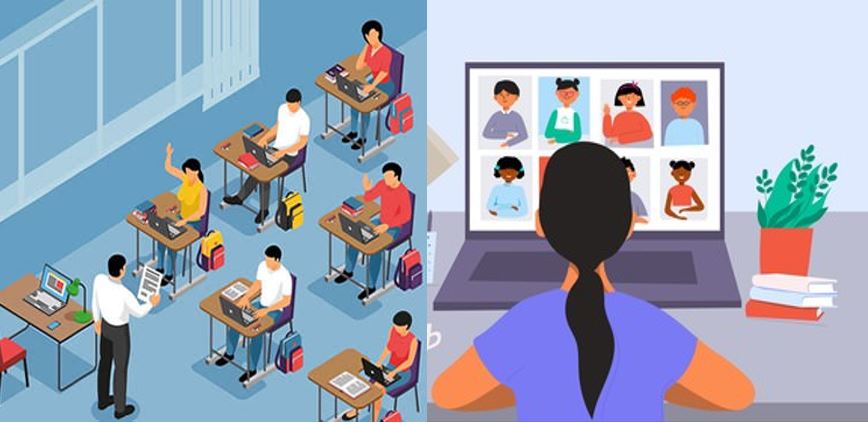The prominent Greek philosopher Plato famously wrote, “Our need will be the real creator”. Somewhat a similar thought must have occurred in the mind of Byju Raveendran while setting up ‘ Think and Learn Pvt. Ltd.‘ to create content for school students, after being encouraged by a set of IIM students after watching his recorded tutorials. The necessity was to reach as many students as possible without being physically present at every location. This small initiative transformed into a revolution known as BYJU’s learning app today. This is just one of the examples, there are many more in line.
The Government of India and several state governments are also facilitating online learning platforms and Radio programs to encourage students to study from the confines of their houses. The outbreak of Coronavirus highlighted the requirement of online studies even more as all the schools, colleges, and institutions were shut down due to the increasing infection.
In the absence of offline classes and coaching, hundreds of competitive exam aspirants were also in a dilemma on how to proceed with their preparation. E-learning platforms like Unacademy, Adda247, Oliveboard, Testbook, Gradeup, etc. guided students to restart their studies in the quarantine days as well.
Platforms like WhiteHatJunior and Codecademy are turning little minds into coding masters where kids are provided with the knowledge of newer programming languages and application building. Free learning videos and sharing of notes over platforms like Youtube, WhatsApp, Telegram has become the new normal for students nowadays. There is a lot that online education has gifted this generation with. But a question that interrupts this motivating saga of revolution is, ‘Is online education enough to literate all the deserving children and youth of our country?‘ The answer is not that easy to get away with. A comparative study needs to be done here to find out the importance of offline learning amidst all the achievements online education has pulled off.
Why has offline education still not left its place and is significant in the overall development of the country?
1. According to Inclusive Internet Index 2021 published by Facebook in collaboration with Economist Intelligence Unit (EIU), London in April 2021, India ranked 49th among 120 countries when it comes to gender equality and accessing the World Wide Web. As the report suggests, Internet availability and affordability were the prime parameters that played a crucial role in India’s diminishing position. Despite having 700 million active internet users and the cheapest data plans, India is still far from achieving 100% Internet inclusion.
Though the report predicted India to have over 6 million internet users by 2025 that’s in the future, what about the present? The reality reflects that the internet penetration rate of India is nearly around 45% which means that more than 50% of the population does not even have an active internet connection or knowledge to use it. There are many rural areas where people are not even aware of online education. In such places, people prefer to turn towards the traditional method of education i.e. Offline.
2. Competitive exam preparation hubs like Old Rajendra Nagar in Delhi for UPSC aspirants are still students’ favorite destinations to drive their careers. A lot of students in UP still prefer to go to Prayagraj for preparation rather than studying on an online platform since they find it difficult to cope up with the technicalities of e-learning. Students who are not very much technically sound and comfortable while using gadgets, find solace in their trusted teachers guiding them by being physically present there.
3. If online education has taken some revolutionary steps, offline education is not behind as well. Traditional blackboards are now replaced with smart boards with teachers using graphics and newer technologies to help students understand topics better. Schools and colleges are collaborating with IT companies, following a practical approach, organizing industrial visits giving students real-life experiences of the outside world.
4. E-learning platforms have created numerous opportunities for talented individuals to share their knowledge and pursue a career in teaching. It actually has changed lives and everyone’s perception of teaching as a profession. But there are several teachers who still would go for the pen-paper mode because it’s hard for them to change the pattern that they have been following for so many years as TURNING THINGS AROUND IS NOT AS EASY AS IT SEEMS. Lack of adaptability is the actual issue here.
5. Schools, colleges, institutions, universities, and all of them were actually based on the offline mode of education though they started giving online facilities to the students during Covid19 once things will get back to normal, they are obviously going to get back to the old school method i.e. students coming over, taking lectures, giving exams sitting in the examination hall. All of this is a part of a student’s life that is not going to fade away because of the evolution of online education.
In the end, I would just like to conclude this with a prudent thought that however progress
E-learning has made but the offline mode of education will never lose its significance as this is what has been followed for ages in every country. E-learning alone cannot fulfill the necessities of every student. It’s imperative that online and offline education go hand in hand and make India a greater strength in literacy. Both have their own advantages and disadvantages but none is less. Therefore, this will always be a battle that can’t be won as both the contenders are winners in their own ways.

Related Posts
Tech-Powered Education Ecosystem: Fintech’s Role in Shaping Schools
Right approach towards skilling & reskilling
How Design Thinking Builds Creative Confidence in Kids
Impact of Virtual Learning on Young Minds and How they are Coping up: Pros & Cons from Industry Experts
Equal opportunities for all: How edtech can help deliver consistent, quality education
Hybrid teaching and learning: Best Practices